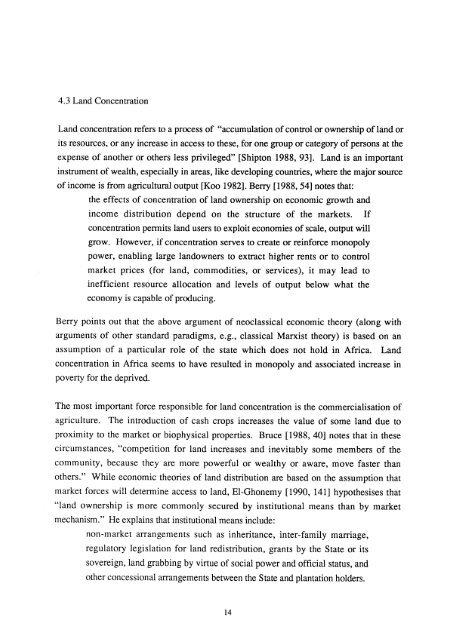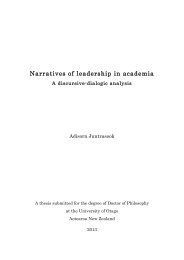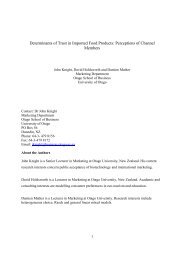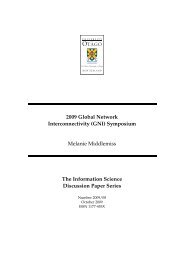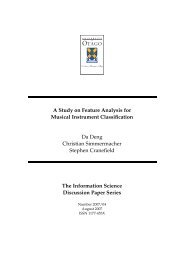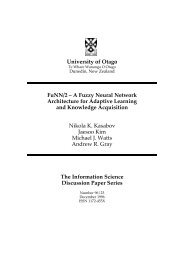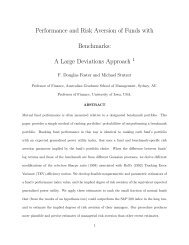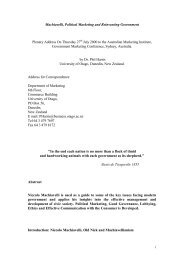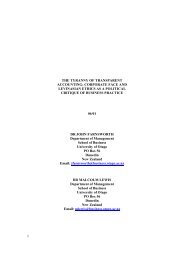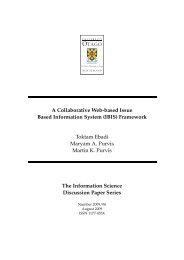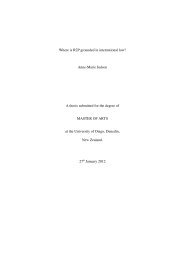University of Otago Cadastral - Otago University Research Archive
University of Otago Cadastral - Otago University Research Archive
University of Otago Cadastral - Otago University Research Archive
Create successful ePaper yourself
Turn your PDF publications into a flip-book with our unique Google optimized e-Paper software.
4.3 Land Concentration<br />
Land concentration refers to a process <strong>of</strong> a c c u m u l a t i<strong>of</strong> o ncontrol or<br />
ownership <strong>of</strong> land or<br />
its resources, or any increase in access to these, for one group or category <strong>of</strong> persons at the<br />
expense <strong>of</strong> another or others less p r i v i l e g[Shipton e d 1988, 93]. Land is an<br />
important<br />
instrument <strong>of</strong> wealth, especially in areas, like developing countries, where the major source<br />
<strong>of</strong> income is from agricultural output [Koo 1982]. Berry [l988, 54]<br />
notes that:<br />
the effects <strong>of</strong> concentration <strong>of</strong> land ownership on economic growth and<br />
income distribution depend<br />
on the structure <strong>of</strong> the markets. If<br />
concentration permits land users to exploit economies <strong>of</strong> scale, output will<br />
grow. However, if concentration sen/es to create or reinforce monopoly<br />
power, enabling large landowners to extract higher<br />
rents or to control<br />
market prices (for land, commodities, or services), it may lead to<br />
inefficient resource allocation and levels <strong>of</strong> output below what the<br />
economy<br />
is capable <strong>of</strong> producing.<br />
Berry points out that the above argument <strong>of</strong> neoclassical economic theory (along with<br />
arguments <strong>of</strong> other standard paradigms, e.g., classical Marxist theory)<br />
is based on an<br />
assumption <strong>of</strong> a particular role <strong>of</strong> the state which does not hold in Africa. Land<br />
concentration in Africa seems to have resulted in monopoly<br />
and associated increase in<br />
poverty for the deprived.<br />
The most important force responsible for land concentration is the commercialisation <strong>of</strong><br />
agriculture. The introduction <strong>of</strong> cash crops increases the value <strong>of</strong> some land due to<br />
proximity to the market or biophysical properties. Bruce [l988, 40] notes that in these<br />
circumstances, c o m p e t i for t i o land n increases and inevitably<br />
some members <strong>of</strong> the<br />
community, because they are more powerful or wealthy or aware, move faster than<br />
o t h e r s . While economic theories <strong>of</strong> land distribution are based on the assumption that<br />
market forces will determine access to land, El~Ghonemy [l990, l4l] hypothesises that<br />
l a n downership is more commonly secured by institutional means than by market<br />
m e c h a n i s m l-le . explains that institutional means include:<br />
non-market arrangements such as inheritance, inter-family marriage,<br />
regulatory legislation for land redistribution, grants by<br />
the State or its<br />
sovereign, land grabbing by virtue <strong>of</strong> social power and <strong>of</strong>ficial status, and<br />
other concessional arrangements between the State and plantation holders.<br />
14


